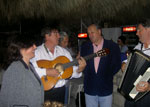 |
 |
I. WHAT CAN DIGITAL LIBRARIES DO THAT TRADITIONAL CANNOT? OR DO IN ADDITION? One reason for the world-wide success of digital libraries is unprecedented access they offer to a growing variety of library resources and services. Another is that they provide a variety of functions and services not possible in traditional libraries. Digital libraries have struck a chord with users. Numerous innovative practices have been developed and more are underway that account for this success and increased use globally. The goal of first LIDA 2005 theme is to explore the realized capabilities and future promises of digital libraries in terms of enhanced or new services, processes, structures, and social practices, and to examine their integration with services, structures, and social functions of traditional libraries and related institutions. Contributions are invited (types described below) on the following topics:
II. BUILDING A SMALL DIGITAL LIBRARY AND DIGITAL LIBRARY NETWORK. Many small organizations wish to build a digital library in their own domain and for their users. Given the limited resources of small institutions, what are the best practices to construct, maintain and share digital libraries? The goal of the second LIDA 2005 theme is to share experiences from practice and research in construction and operation of small digital libraries at a variety of institutions or domains, and in related networks and infrastructures on regional, institutional, or subject basis. This particularly involves small public and school libraries, libraries that serve remote areas, regional libraries, and specialized libraries. Contributions are invited that approach building, maintaining, and improving small digital libraries and networks from a number of perspectives. These include:
|
    
|
Last revised: June 12th 2005. |